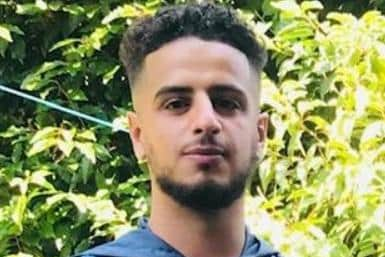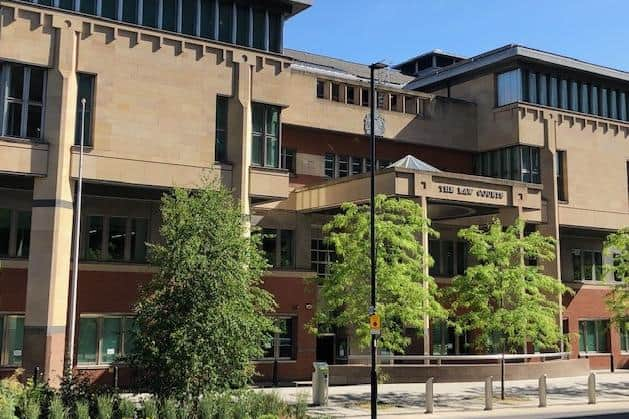Three Sheffield men accused of murdering Ramey Salem in "cold-blood" decline to give evidence during trial
and live on Freeview channel 276
The on-going trial at Sheffield Crown Court has heard how Jabari Fanty, Aaron Yanbak and Ricardo Nkanyezi have all denied murdering 20-year-old Ramey Salem at a flat on Grimesthorpe Road South, Burngreave, Sheffield, on November 16, 2020.
Stephen Wood QC, prosecuting said a ballistics expert suggested Mr Salem was shot at least five times with two shots fired in the lounge before he fled into the hallway and bathroom where further shots were fired.
Advertisement
Hide AdAdvertisement
Hide AdMr Wood, who claims the case concerns drugs, gangs and guns, told the jury on June 15 during his closing speech: “You may think, ladies and gentlemen, having heard something of the details there is no doubt, is there, that he was murdered - and Ramey Salem was murdered in cold-blood?


“Can you barely imagine the terror he must have felt when two shots were fired into the lounge from what you must think can only have been from close range. He must then have at least seen the gunman.
“He was then pursued out of the lounge along the hallway until he was trapped in the toilet. Shots being fired at him as he tried to get away along the hallway until he was trapped in the toilet.”
The pathologist identified the final shot from Mr Salem’s injuries which had an acute upward trajectory into his body, according to Mr Wood.
Advertisement
Hide AdAdvertisement
Hide AdMr Wood told the jury: “What that meant, according to the pathologist, was that Ramey Salem was shot as he cowered from his pursuer or as he laid down with the gunman behind him. He was shot in the back. It was an execution – nothing more, nothing less.”


An expert believes the recovered cartridges revealed there were most likely two firearms involved and they were possibly converted from blank-firing pistols, according to Mr Wood.
Mr Wood added Jabari Fanty, Aaron Yanbak and Ricardo Nkanyezi were allegedly caught on CCTV and located by phone records near the crime scene.
He also claimed ballistics from the gun fired in the lounge indicated this weapon had also been used in another incident involving the attempted murder of Ali al-Humakaini a month earlier.
Advertisement
Hide AdAdvertisement
Hide AdHe argued Jabari Fanty, Aaron Yanbak and another defendant, Jordan Foote, were allegedly involved in the attempted murder of Ali al-Humakaini after he was shot at Osgathorpe Park, Burngreave, Sheffield, on October 31, 2020.
Mr Wood also claimed the same gun was used in a shooting on November 2, 2020, in Rotherham, after Aaron Yanbak and Ricardo Nkanyezi had allegedly been pursued by a 4x4 vehicle.
The ballistics from the suspected second gun used during the shooting of Ramey Salem was also linked it to a firearms incident on October 19, 2020, at Longley Avenue West, Shirecliffe, involving the occupant of a VW Golf shooting at the occupants of a Seat Leon car, according to Mr Wood.
Mr Wood said Jordan Foote also allegedly fled from a stolen BMW car with others at Walkley Street, Sheffield, during another incident, before officers recovered a handgun, drugs and cash in the vehicle.
Advertisement
Hide AdAdvertisement
Hide AdPolice also found alleged drug dealing paraphernalia at Jordan Foote’s home and the handgun linked to the BMW was examined and possible DNA matches were found linked to Jabari Fanty and another man.
Following Jabari Fanty’s arrest, Mr Wood said he was allegedly found to have a knife, two mobile phones a ballistic vest, a baton, masks, scales with traces of drugs and Nike trainers said to match a footprint from the murder scene.
Mr Wood said when Aaron Yanbak was arrested a firearms magazine was allegedly recovered and gunshot residue was found on his clothing, and Ricardo Nkanyezi was allegedly found with a bag with drugs and a gun in a rucksack.
The defendants have declined to give evidence or be cross-examined but Mr Wood has argued this decision suggests they have no credible evidence to give and means they cannot be questioned about their locations, telephone calls, messages, clothing, DNA, gunshot residue and drugs.
Advertisement
Hide AdAdvertisement
Hide AdFanty, aged 19, of Broadhead Road, Stocksbridge, Sheffield; Yanbak, 20, of Abbeydale Road, Abbeydale, Sheffield; and Ricardo Nkanyezi, 20, of Morgan Avenue, Parson Cross, Sheffield, have all pleaded not guilty to murder.
Jordan Foote, 20, of Basegreen Road, Basegreen, Sheffield; Fanty and Yanbak have all pleaded not guilty to the attempted murder of Ali al-Humakaini.
Fanty, Yanbak, Nkanyezi and Foote have all pleaded not guilty to conspiring to possess firearms with intent to endanger life, not guilty to conspiring to possess ammunition with intent to endanger life, and not guilty to conspiring to supply class A drugs.
Fanty has also pleaded not guilty to possessing a bladed article and Nkanyezi has also pleaded not guilty to possessing a firearm.
The prosecution’s on-going closing speech is expected to be followed by submissions from the defence counsel and the judge before the jury is sent out to consider their verdicts.
